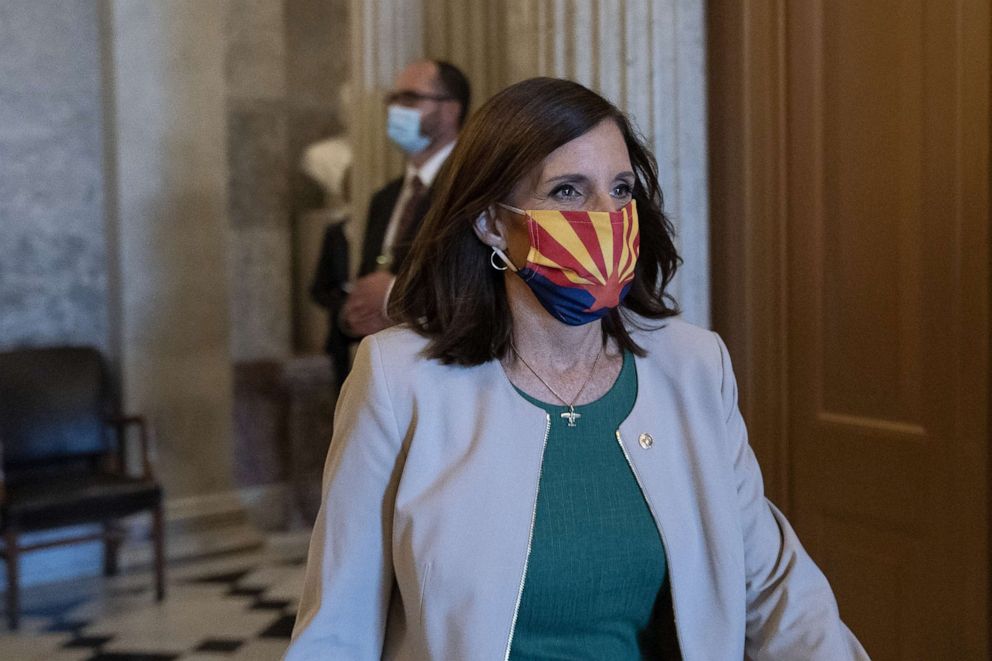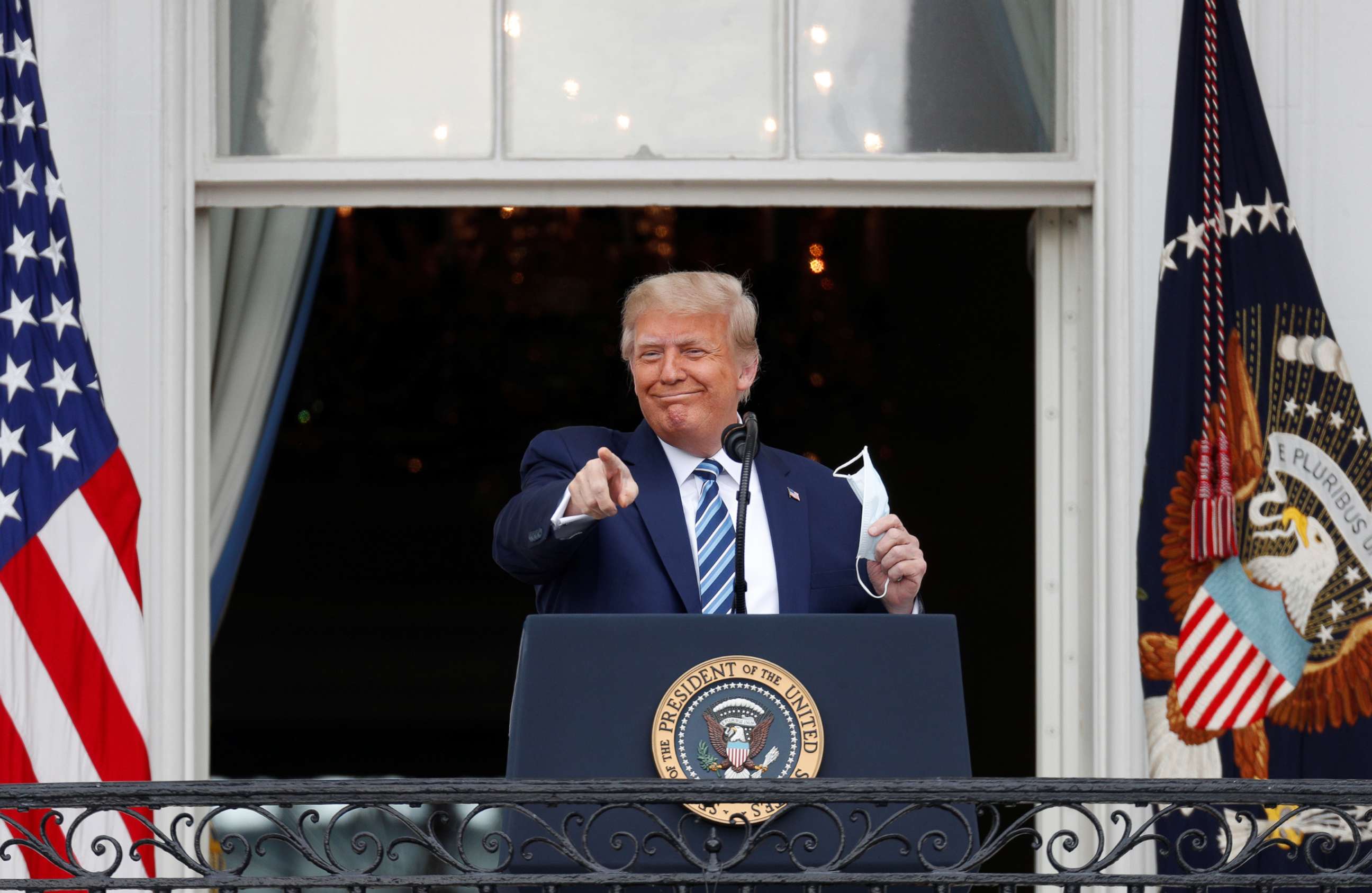Independent voters in Arizona pushed the state into battleground territory
ABC's "This Week" took a trip to Arizona to talk with independents before Nov. 3
Arizona has long been considered the state of maverick voters -- of the state's over 4 million registered voters, 1.3 million of them are registered as independents.
Regardless of party, Arizonans take pride in their tendency to vote with their conscience and not always along party lines.
Even amongst candidates as they run tough campaigns or re-election bids, the pitch to independent voters is a recurring one. In the contentious 2018 Senate race, Democrat Kyrsten Sinema focused just as much on getting out the vote for independents as she did on Democrats or moderate voters. She was the first Democrat to be sent to the Senate by Arizonans since 1995.
As appointed Republican Sen. Martha McSally has employed throughout her campaign to stay in the Senate, candidates are often forced to center messaging around their independent records.

The population of independent voters is skyrocketing in Arizona, much like across the nation. A study by the Morrison Institute at Arizona State University found that in 1992 just 11.6% of Arizona's electorate were unaffiliated. Today it sits at around 33%.
ABC's "This Week" spent a few days in the Grand Canyon State, talking with voters about the presidential election, the electorate and how independents feel in the consequential battleground.
Life-long Republicans Linda and Tom Rawles now spend their evenings at the edge of their driveway with a Joe Biden sign, waving to passersby as they prepare to vote Democrat in the general election.
They weren't fans of President Donald Trump's as he was on the campaign trail in 2016, so they cast their ballots for Gary Johnson.
But what set them over the edge enough to leave the party was the president's response to the violence and right-wing protests in Charlottesville, Virginia, in 2018.
"So we were sort of already there, but certainly Charlottesville, is the time when I said, 'enough,'" Tom told ABC News outside of his home in Carefree, Arizona, a part of Maricopa County, which is also home to Phoenix.
"Right now in the Republican Party if you're not a fan in the cult of Donald Trump, you're not welcome and they will tell you that," Linda added.
Arizona State University public affairs professor Dr. Thom Reilly said the independent voting bloc is pushing the state out of it's once-ruby red home on the political spectrum -- and right into deep purple territory.
"What we're seeing is is general frustration, to the divisiveness that is occurring in Washington and across the United States, and people are searching for a different way," he said.
That is especially true for Latino voters who are increasingly becoming a larger percentage of the state's population and voting bloc.
In 2019, according to Pew Research Center, Maricopa County was home to the fourth-largest growing Hispanic or Latino population in the entire country. Those who identify as Hispanic or Latino make up nearly 30% of the county's population, and the median age of Hispanics in the entire state is lower than it is in many states where the population supersedes 1 million Hispanic residents.
Pew also reports that the economic downturn stemming from the pandemic has hit Latinos and Hispanics especially hard: The unemployment rate for Hispanics increased from 4.8% in February to 18.5% in April and dropped back to 14.5% in June.
Trump narrowly won the county in 2016 by only three points and two years later when Sinema was running against McSally, she carried the county with 51 points, with McSally trailing behind at 46.8.

As the race to the White House continues down an increasingly polarized path, some Latino voters are without a major party to call their own, especially as the candidates squabble over immigration policies, which are oftentimes top of mind issues.
Karilyn Van Oosten immigrated to the United States from the Dominican Republic as a young adult. While she has cast Democratic ballots in the past, she wants the party to know not to take Latino voters for granted.
"They're just taking it for granted and thinking, 'Oh, hey, well, they're Latinos, and they're going to go ahead and lean Democrat.' That's not the case," she said.
"A lot of the Democratic Party has been neglecting to really address that issue of immigration," Van Oosten added. "And that's why we see that a lot of the Latino voters are really just going -- they're really up for grabs and they are having a hard time making a decision of which way to go, because no one is addressing the issues that matter to them most."
But despite what may appear as a shift to the left in Arizona, some independent voters are re-evaluating their lack of support for the president, like Barbi Rouen, who also voted for Johnson in 2016.
"Since coronavirus has come out, our economy has stayed fairly stable. And that to me is astonishing especially considering the number of people who are out of jobs because they can't go in," she said. "(Trump)'s allowing the states to make the decisions for themselves, which is what it should be."
With less than a month until Election Day, and millions of ballots already in the mail using the state's long-established and often-utilized mail-in ballot system, the final push to pull voters toward one major party on the general election ballot is more important than ever.
Polling consistently shows a close presidential race among Democrats and Republicans. The last ABC News / Washington Post poll out of Arizona saw Biden at 49% and Trump at 47%. But among Independent voters, the numbers tell a different story. A New York Times / Siena College poll found Biden up 25 points among Independents.




